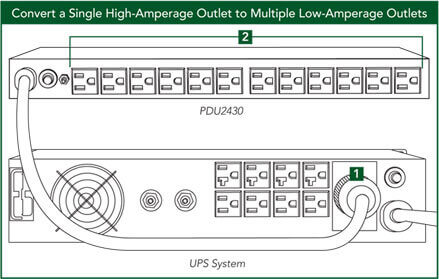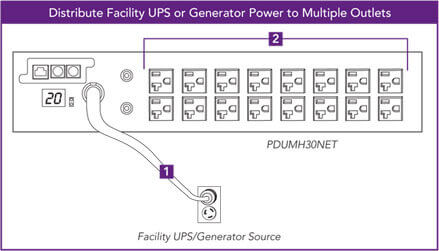A Power Distribution Unit is a versatile component in your power infrastructure. Here, you will find a few examples of PDU installations that meet specific rack design goals.
- Add More Outlets to a UPS System
- Convert a Single High-Amperage Outlet to Multiple Low-Amperage Outlets
- Distribute Facility UPS or Generator Power to Multiple Outlets
- Provide Independent Power Sources for Devices with Redundant Power Supplies
- Provide Redundant Power Sources for Devices without Redundant Power Supplies
- Make Any On-Line UPS System Hot-Swappable
- Monitor Load Levels and Avoid Overloads
- Control Individual Outlets Remotely
Add More Outlets to a UPS System
Applicable PDUs: All Models
- The PDU plugs into an outlet on the UPS system.
- The PDU increases the total number of outlets powered by the UPS system.

Convert a Single High-Amperage Outlet to Multiple Low-Amperage Outlets
Applicable PDUs: Models with High-Amperage Plug or Inlet
- The PDU plugs into a high-amperage outlet on the UPS system.
- The PDU spreads the high-amperage input among multiple low-amperage outlets, allowing the UPS system to power multiple devices from a single outlet.

Distribute Facility UPS or Generator Power to Multiple Outlets
Applicable PDUs: All Models
- The PDU plugs into a wall outlet supported by facility UPS or generator power.
- The PDU distributes power to equipment via multiple outlets.

Provide Independent Power Sources for Devices with Redundant Power Supplies
Applicable PDUs: Dual Circuit Models
PDUs with dual power circuits provide an efficient power distribution solution for equipment with redundant power supplies, combining the advantages of two separate high-amperage PDUs without the added expense, space requirements and management complexity. Input cords, breakers and outlets are color coded to match each independent circuit, simplifying cable management.
- Each PDU input cord plugs into an independent UPS, utility or generator power source.
- The PDU distributes power to equipment with redundant power supplies, providing an independent power source for each power supply. (The PDU also works with equipment that does not have redundant power supplies.)

Provide Redundant Power Sources for Devices without Redundant Power Supplies
Applicable PDUs: Auto Transfer Switch Models
Automatic transfer switch (ATS) PDUs eliminate equipment downtime by automatically switching to a secondary power source if the primary source fails or requires maintenance. Dual AC inputs can be connected to two utility sources, two generator sources, two UPS sources or any combination.
- The primary input plugs into the primary UPS system, which must be an on-line UPS system.
- The secondary input plugs into the secondary UPS system. Ideally, the UPS systems should be connected to separate circuits.
- The PDU monitors voltage and frequency, automatically switching to the secondary input if the primary input deviates from the designated operating range (99-138V / 45-65 Hz).

Make Any On-Line UPS System Hot-Swappable
Applicable PDUs: Hot-Swap, Auto Transfer Switch Models
- The primary input plugs into an on-line UPS system.
- The secondary input plugs into a wall outlet.
- If the UPS system is taken offline for maintenance, repair or replacement, the PDU keeps the load powered by automatically switching from the primary input to the secondary input. When the UPS system is restored, the PDU will switch back to the primary input.

Monitor Load Levels and Avoid Overloads
Applicable PDUs: Metered, Monitored and Switched Models
Connecting additional equipment to a PDU can overload the PDU or the supply circuit, causing equipment downtime. Metered, Monitored and Switched PDUs display load levels in real time, allowing additional equipment to be connected safely.
- The primary input plugs into an on-line UPS system.
- The secondary input plugs into a wall outlet.
- If the UPS system is taken offline for maintenance, repair or replacement, the PDU keeps the load powered by automatically switching from the primary input to the secondary input. When the UPS system is restored, the PDU will switch back to the primary input.

Control Individual Outlets Remotely
Applicable PDUs: Switched Models
- The PDUs network interface connects to an Ethernet jack.
- Remote users can switch each of the PDUs outlets on or off via SNMP, Web or telnet. Benefits include rebooting locked devices to avoid costly service calls and turning off nonessential loads during blackouts to extend battery backup runtime for critical equipment.


